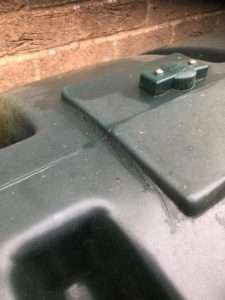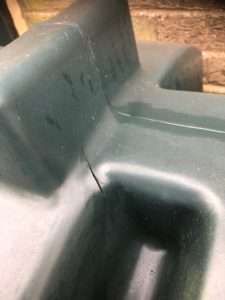Oil Tank Leak
An oil tank leak is top of the list of real concerns if you own a plastic bunded oil tank. Thankfully oil tank leaks are quite rare these days.
 You should keep your tank well maintained and service it regularly in order to reduce the risk of costly problems.
You should keep your tank well maintained and service it regularly in order to reduce the risk of costly problems.
Let’s get the bad news out of the way first – an oil tank leak in a plastic tank is non-repairable. Plastic tanks have many advantages, but even good quality plastic bunded tanks can split. When this happens your only option is to replace it – contact us if you have an emergency need and we’ll get someone on the case as soon as possible.
A crack in your tank needs instant attentions, it’s crucial you replace the tank as soon as possible. Remember, the only option is an oil tank replacement. One of our experienced OFTEC registered engineers will attend your property to assess the situation, recommend a solution then replace your oil tank and transfer your oil from the old tank to the new.
A quick fix to stop an oil tank leak and the risk of oil getting into the local environment or water getting into the tank is to rub a bar of soap into the crack, Yes, it’s hard to believe but soap does offer a good, quick solution. Duct tape can also help stem the flow of oil out of the tank but these are both only temporary fixes. As soon as you see a crack you must act fast. Call us and we’ll help you replace your tank and make everything safe as soon as possible. In the meantime collect any oil drips in a bucket and use soil or other absorbent material to prevent oil from entering your drains.
Oil Tank Leak Prevention
Prevention is always your best option because it’s impossible to repair a damaged oil tank. You should check your tank regularly and pay attention for any danger signals. One of our OFTEC technicians can carry out a Tank Health Check if you’re worried. During that check we will review the overall condition of the tank and provide advice and tips for maintaining your tank and extending its life.
A bunded oil tank is still a great investment. It is the safest way to store your heating oil at home but things can go wrong. Here are some of the key sources of danger for an oil tank:
Winter Weather
A sudden drop in temperature can cause the plastic on your tank to become brittle. In this state it’s more prone to physical damage in the form of cracks and splits. You should make a habit of visually inspecting your tank regularly so you can keep an eye out for warnng signs like sudden drops in your fuel levels. Snow is another risk factor. You should clear snow as soon as it accumulates as the extra weight places strain on the tanke which might result in cracks . Especially when the plastic is brittle on account of the cold.
Sun Exposure
Tanks in direct sunlight become discoloured or whitened as the heat from the sun causes the tank to expand and possibly deform. Eventually the tank will weaken at the points which take the most weight and cracks may develop. When that happens oil will escape or water will enter the tank which can lead to fuel contamination, costly oil spills, and possibly even boiler breakdowns.
The best preventitive measure is to install your tank away from direct sunlight. If for any reason that’s not possible erect some OFTEC regulation compliant fencing around your tank.
Water
Your tank must at all times remain watertight, ensure that the lids are always securely closed and that there are no cracks or damage where water can enter. Once water enters an oil tank sludge forms and bacteria grows which leads to clogged fuel filters, injectors and lines.
Badly Fitted Oil Tank Base
Prevention is better than cure, read on to find out more information on what to do if you have a leak and some simple steps you can take to help prevent it.
Danger Signs
- Cracks – are there any small or large cracks your tank?
- Discolouration – is the tank is turning white or fading?
- Bulges – is there any bowing where the tank is bulging?
- Smell – are you able to smell fuel?
- Stains – have any stains or wet patches appeared around your tank
Leaking Tank Actions
 Stop the flow of oil by turning off the tap
Stop the flow of oil by turning off the tap- Identify where the oil leak is coming from
- Try to absorb any spilt oil with sand or other absorbant material
- Prevent the flow from entering nearby buildings or watercourses
- Find out whether the heating oil leak has affected any of your neighbours
- Work out how much fuel has been lost from the tank
- Notify your insurance company as soon as possible. It is likely they will arrange for contractors to respond to the spill however they usually won’t cover poorly maintained tanks or pipes.
- Speak to your fuel supplier to request they uplift the remaining oil as quickly as possible.
- Phone the Environment Agency on 0330 107 1352 if the oil leak has entered the water supply or caused damage to neighbouring property.
- Contact us if you need assistance from OFTEC registered engineers.

 Stop the flow of oil by turning off the tap
Stop the flow of oil by turning off the tap